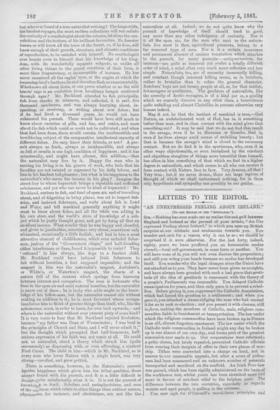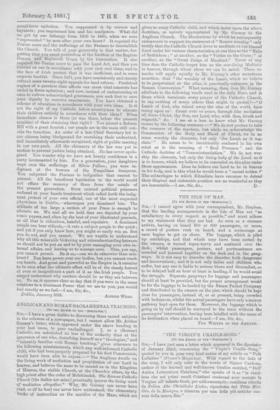LETTERS TO THE EDITOR.
"AN UNEXPRESSED FEELING ABOUT IRELAND." [TO TIM EDITOR Or TER " FIPTIOTAVOR.") Saar—Nothing has ever made me so realise the sad gulf between England and Ireland as the perusal of your article, "An MD, expressed Peeling about Ireland," in which you sum up British surprise at our attitude and sentiments towards you. You wonder and seek for a reason why it can be so ; we should be surprised if it were otherwise. For the last forty, indeed, eighty, years we have proffered you an honourable modus visendi,—local self-government, in some form or another. You will have none of it, you will not even discuss the proposition ; and still you wring your hands because no modus has developed itself. You wonder why the legal changes since the Union have not.attaehed us to you. They have never been given us as rights, and have always been granted with such a bad grace that grati- tude (if the idea of gratitude is consonant with the theory of a people's Parliament) was impossible. You delayed Catholic emancipation for years, and then only gave it to prevent a rebel- lion, Before giving it, you suppressed the Catholic Association, which had forced the question to a settlement ; and when you gave it, you attached a clause obliging the man who had carried it for us to seek re-election ; and you passed it with clauses, still in force, making the members of Catholic, male, religious com- munities liable to banishment or transportation. The law under which the religious communities have been broken up in France is an old, almost forgotten enactment. The law under which the Catholic male communities in Ireland might any day be broken up is one almost of our own day, and forms part of the greatest concession ever made to us, Our corporations were reformed; a petty clause, but lately repealed, prevented Catholic officials from wearing their insignia of office in their own places of wor- ship. Tithes were converted into a charge on land, not in answer to our reasonable appeals, but after a score of police- men had been massacred and an unknown number of peasants transported and sacrificed on the scaffold. An Irish Poor-law
was passed, which has been rigidly administered on the basis of the workhouse test, whilst yours has been stretched more and
more in favour of out-door relief to the helpless poor. The difference between the two countries, especially as regards women and aged people, is galling in the extreme. You now sigh for O'Coenell's moral-force principles and moral-force agitation. You suppressed it by cannon and bayonets ; you imprisoned him and his coadjutors. What did we get by our lethargy from 1850 to 1865, when we were " represented " by men after your own heart It required the Fenian scare and the sufferings of the Fenians to disestablish the Church. You talk of your generosity in that matter, for- getting that you eased yourselves of the burthen of the Regium Donum and Maynooth Grant by the transaction. It also required the Fenian scare to pass the Land Act, and then you hurried on one in accordance with your (not our) ideas, and in the face of Irish protest that it was inefficient, and in some respects hurtful. Since 1871, you have consistently and sternly refused some twenty-eight appeals for land reform. Persistent neglect of a question that affects our most vital interests has ended in fierce agitation ; and now, instead of endeavouring at once to redress acknowledged grievances, you seek first to save your dignity by coercive enactments. You have obtained a scheme of education in accordance with your own ideas. Is it not the right of my Catholic fellow-countrymen to educate their children entirely in accordance with their ideas P What immediate chance is there (or was there, before the present troubles) of their obtaining that right ? You passed a Reform Bill with a great flourish ; our people are in the main still out- side the franchise. An order of a late Chief Secretary led to our citizens being bludgeoned for exercising their undoubted, and immediately afterwards recognised, right of public meeting in our own park. All the chicanery of the law was put in motion to prevent justice being obtained. He has never apolo- gised. You wonder why we have not hearty confidence in a party lieutenanted by him. For a generation, your daughters wept over the sufferings of Silvio Pellieo ; you were in- dignant at the horrors of the Neapolitan dungeons. You subjected the Fenians to indignities that cannot be penned. All the beneficent legislation in the world would not efface the memory of them from the minds of the present generation. Even untried political prisoners endured at your hands treatment which called forth the indig- nant protest of your own official, one of the most respected physicians in Dublin,—whereupon you dismissed him. The attitude of too large a section of your Press is enough to alienate us. We and all we hold dear are depicted by your comic papers, and often by the best of your illustrated journals, as all that is ridiculous, hateful, and repulsive. A dominant people can bear ridicule,—it cuts a subject people to the quick ; and yet if you only knew how, you might so easily win us. But you do not, and you cannot. We are unable to understand why all this miserable bickering and misunderstanding between us should not be put an end to by your managing your own in- ternal affairs, and leaving us to manage ours. This, you say, you cannot permit. Be it so,—can we do otherwise than mis- trust? You have power over our bodies, but you cannot reach our hearts. And great and powerful as the Empire is, it remains to be seen what the ultimate effect will be of the steady hatred of even so insignificant a part of it as the Irish people. You canpot understand why matters should be as they are between us. To us, it appears clear as day that if you were in the same relations to a dominant Power that we are to you, you would feel exactly as we feel.—I am, Sir, &c.,



































 Previous page
Previous page